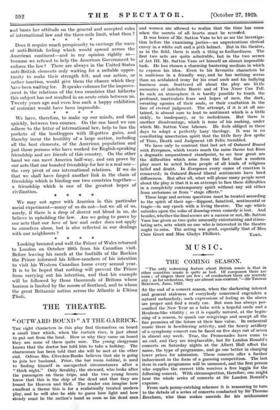THE THEATRE.
"OUTWARD BOUND" AT THE GARRICK.
Tun eight characters in this play find themselves on board a small liner which, when the curtain rises, is just about to put out from the land. How or why they came on board they are none of them quite sure. The young clergyman knows that the doctor has told !Mil to take a holiday. The charwoman has been told that she will be met at the other end. Odious Mrs. Cliveden-Banks believes that she is going to join her husband. Prior, the bar room habitue, is used to finding himself in unexpected circumstances after a " thick night." Only Scrubby, the steward, who looks after the passengers on these trips, and the two young lovers know that this is the ship of the dead and that they are bound for Heaven and Hell. The reader can imagine how excellent a theme this is for a realistically treated modern play, and he will also be able to guess how light and how steady must be the author's hand as soon as his dead men
and women are allowed to realize that the tithe has come when the secrets of all hearts must be revealed.
It was brave of Mr. Sutton Vane to let us see the investiga- tion before the examining justice—an unpretentious clerical envoy in a white suit and a pith helmet. But in the theatre, as in the field, there is such a thing as foolhardiness. The first two acts are quite admirable, but in the two scenes of Act III. Mr. Sutton Vane set himself an almost impossible task. He has chosen a charming bantering medium in which to express his idea. Even to his favourite characters he is malicious in a friendly way, and he has nothing worse than an acidulated irony for his cruel snob and his bullying business man. Scattered all about the play are lit tic memories of indefinite Barrie and of You Never Can Tell. In such an atmosphere it is hardly possible to touch the profound, inarticulate fears and hopes of men, the dark, sweating agonies of their souls, or their exultation in the face of eternal judgment. The attempt, if it is at all sus- tained, is almost sure to lead to sentiment which is a little sickly, to inadequacy, or to melodrama. But there is another disadvantage, which is none of his making, under which Mr. Sutton Vane labours. He feels obliged in these days to adopt a perfectly hazy theology. It was in no conciliating unsectarian spirit that the little fiery Jew spoke of Time, Death and Judgment till Felix trembled.
We have only to contrast that last act of Outward Bound with Everyman, which treats much the same theme but from a dogmatic unquestioned standpoint, to see how great are the difficulties which arise from the fact that a modern play must be acted before people of all kinds of religious belief and doubt. In Everyman every ounce of emotion is conserved; in Outward Bound liberal sentiments have bred diffuseness. But after all, what will please many people most about the play is that it is an attempt to face these difficulties in a completely contemporary spirit without any aid either from archaisms or from " stage effects."
These large and serious questions must be treated according to the spirit of their age—flippant, fanatical, sentimental or tragic—in any epoch with a living theatre. The age which subsides upon the sofas of drawing-room comedy is lost. And besides, whether the final scenes are a success or not, Mr. Sutton Vane has given us two quite unusually entertaining and stimu- lating acts, acts which no one who is interested in the theatre ought to miss. The acting was good, especially that of Miss
Clare Greet and Miss Gladys Ffolliott. TARN.














































 Previous page
Previous page